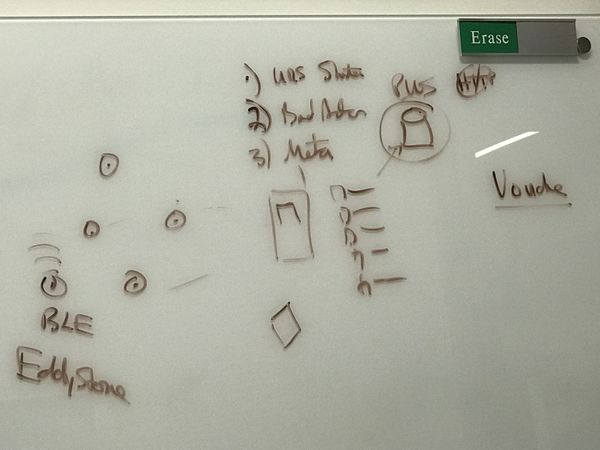2017/iw4hw
IndieWeb for Hardware was a session at IndieWeb Summit 2017.
Notes archived from: https://etherpad.indieweb.org/iw4hw
Video at: https://www.youtube.com/watch?v=6tRfftl6j6k
When: 2017-06-24 15:00
Participants
Notes
Diagram of the physical web:
- New beacon standard: EddyStone (github.com/google/eddystone)
- Problem 1: only 18 bytes data for URLs sent by beacon (simple compression scheme so https://www. is a single byte), everyone uses url shortener
- Problem 2: bad actors, spam, phishing, etc.
- http://indieweb.org/vouch
- common case - url for device or url for store
URL for this project: https://google.github.io/physical-web/
Key issue with the physical Web: It requires a central server
Initialy for caching
but quickly became a ranking/authority engine
I created the very thing I didn't want it to be! (A centralized web discovery system)
This is the problem in a nutshell, you can't 'just show everything' as they are bad actors out there
How can you provide some level of filtering/validation of websites out there?
IndieWeb tie in: This doesn't apply to just the Physical Web but to all indieweb links
Historically there are three(ish) solutions: Central authority, web of trust, reviews (which are kind of central authority)
There is no clear way to have a DE-centralized web of authority (but it seems to be a core value of the internet in general)
This makes me think of SSL, Google tried https://www.certificate-transparency.org/ (interesting!)
If we can solve this, we solve a big problem but it seems untenable
The question can be how can we solve a corner of it
Josh: If you were to have something physical in the museum to broadcast an 'authority url' it would validate what you can see
This puts an authority at the location (vs a central authority)
Ryan: In a sense another solution would be to reinvent PageRank (but again another central authority)
Discussion around two web approachs:
Start with me and who I know, follow those thinks to the target URL
Start with the target URL and have it say who will vouche for it and follow those links
There is an open source python script at physical Web (https://github.com/google/physical-web/tree/master/web-service) that is an google app engine instance that shows this running (in a simple cache version)
Ryan: Look into VOUCHE, it is a start to validating something. The big downsize is that it will likely have very very small coverage
Scott: Building the Physical Web has taught us quite a bit, instead of coming up witha perfect solution, let's build something simple (and likely to fail) and see what we learn, baby steps...
Further notes during dinner:
- Main goal is to thwart phishers/bad actors
- Consider an approach that makes it hard for them to be seen
- If the scanner was to initially not show new beacons
- But only show ones that have got some 'traction'
- This would require the scanner to have a means to show hidden beacons
- Valid beacons would be sought out and clicked on
- Clearly not perfect, naive approach could easily be gamed
- However, how might we make it much harder (1 vote/MAC address, needs votes over a few days, etc)
- LIke any security situation, there is no guarantee, only a 'hardening' the process that is easy for good actors, hard for bad ones)
- Other solution was to provide a means of using a validation server
- Mostly of use by professional companies (vs hobbiests)
- But if there were to be 'rel=me' links from sites that would be trusted, it could create a CA style approach for at least big actors to 'level up' quickly
Creates a 2 prong approach:
- a more complicated CA approad for professional users to rise quickly
- a much slower approach for personal use that will show up as they are used properly
- But this requires a scanner 'more' option
- But this has an additional benefit for hobbiests (which would turn on the more option temporarily when testing)

